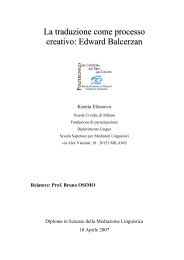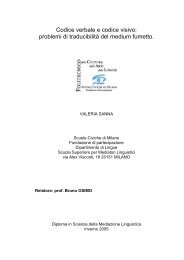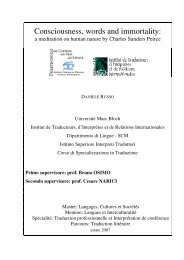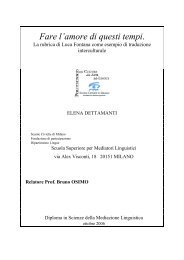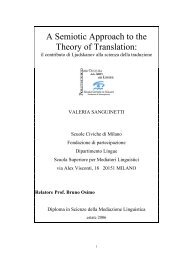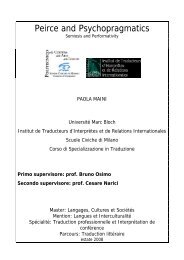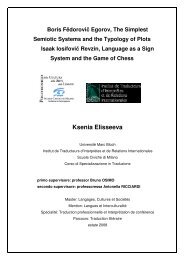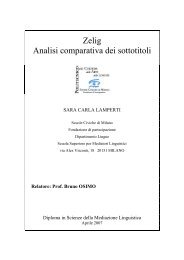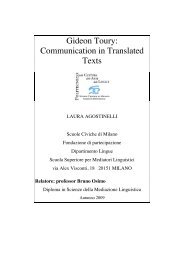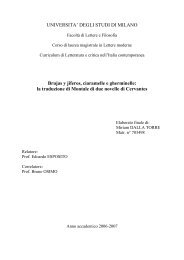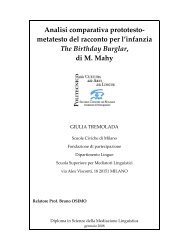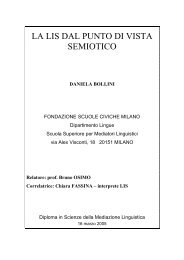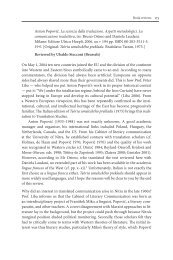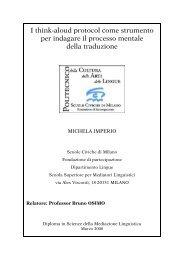Alice in Wonderland - Bruno Osimo, traduzioni, semiotica della ...
Alice in Wonderland - Bruno Osimo, traduzioni, semiotica della ...
Alice in Wonderland - Bruno Osimo, traduzioni, semiotica della ...
Create successful ePaper yourself
Turn your PDF publications into a flip-book with our unique Google optimized e-Paper software.
surpris<strong>in</strong>g that the name of the protagonist, <strong>Alice</strong>, is left as it is by almost<br />
all translators. The Spanish translator follows the convention of adapt<strong>in</strong>g the<br />
form of the name to Spanish morphology. German, French, Italian and<br />
Brazilian readers will pronounce the name accord<strong>in</strong>g to their respective<br />
phonologies. The Brazilian translator consistently adapted all the names, so<br />
did Enzensberger (DE-ENZ), with the exception of Ada and Mabel. Ada is<br />
not a German name, nor is Mabel, which sounds rather weird <strong>in</strong> German<br />
pronunciation. In an adaptation, we might also expect “typical” names for<br />
pets (like Mimi <strong>in</strong> BR, which would be Mieze for a German cat) or<br />
housemaids.<br />
As we have mentioned before, for A3, like for A2, the characters are<br />
fictitious anyway. Therefore, an adaptation of the names allows for easier<br />
pronunciation and does not <strong>in</strong>terfere with the identify<strong>in</strong>g function. However,<br />
target-culture proper names mark the sett<strong>in</strong>g as belong<strong>in</strong>g to the target<br />
addressee’s own real world, and the translator should make sure to keep up<br />
this strategy throughout the story, <strong>in</strong> order not to produce culturally<br />
<strong>in</strong>coherent scenes.<br />
The Brazilian translator is very consistent <strong>in</strong> this respect and omits all<br />
references to historical figures. It was a ship-wreck, and not William the<br />
Conqueror that had brought the Mouse over, and the “dry story” about the<br />
unpronounceable Earls is turned <strong>in</strong>to a “very dull old story,” which is not<br />
reproduced <strong>in</strong> detail. The German translator Teutsch (DE-TEU) is not quite<br />
as radical, but she composes a new schoolbook text with many dates and<br />
references to English history, us<strong>in</strong>g German exonyms for the names of<br />
persons. Enzensberger (DE-ENZ) uses a cultural substitution, referr<strong>in</strong>g to<br />
German historical figures. This is consistent with the general procedure he<br />
uses translat<strong>in</strong>g proper names, but it is not always <strong>in</strong> l<strong>in</strong>e with his<br />
translation of other cultural references, as I have tried to show <strong>in</strong> Nord 1994.<br />
The names of the historical persons (apart from William the<br />
Conqueror, for whom the other languages have exonyms) are rather hard to<br />
pronounce for anybody who is not familiar with the English language. If the<br />
41



